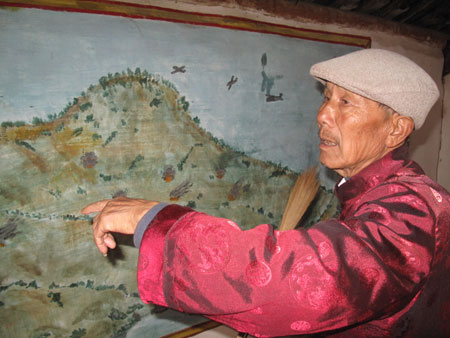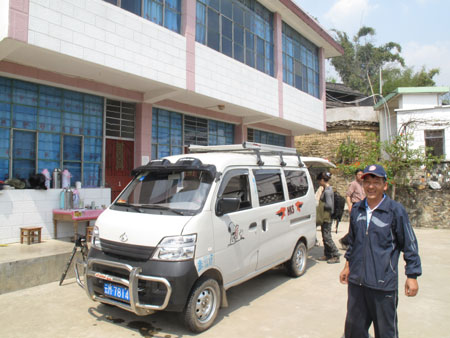People
Building blocks of wealth
Updated: 2011-04-19 08:47
By Chen Liang and Li Yingqing (China Daily)
|
 Wu Chaoming, 76, shows visitors a painting of the Western Yunnan Battle during World War II, at his private museum. Photos by Chen Liang / China Daily |
For a father and son in Baihualing village, planting chestnut trees has brought in incomes that have fueled other lucrative businesses. Chen Liang and Li Yingqing report.
Wu Chaoming and Hou Tiguo are a popular father-son pair in Baihualing village, Baoshan, Yunnan province. They are regular invitees at weddings and funerals. "Invitations even come from other counties," Hou, the son, says. "And every time we have to give 50 or 100 yuan as a hongbao (red envelope with money) to the host. Last year, we gave out nearly 10,000 yuan ($1,528) as hongbao. It can be quite a burden for a rural family."
The 76-year-old father, who married into the Hou family and gave up his right to pass on his surname, is one of the few Baihualing seniors who is literate.
He was also the first person in the village to plant chestnut trees, the founder of Baihualing's only private museum, and the only one to have a published book.
He studied at an old-style private school at Baihualing, which was a battleground between 1942 and 1944, during the War of Resistance against Japanese Aggression (1937-1945). After the Western Yunnan Battle, which destroyed most of Baihualing, Wu and his fellow villagers began to collect bomb and bullet shells and sell them.
|
 Hou Tiguo runs a family hotel, which receives birdwatchers and conservationists to the Gaoligong Mountain National Nature Reserve. |
"They could be found everywhere. In 1946, you could get a kilogram of copper for 16 kg of bomb and bullet shells," Wu says, in the courtyard of his house. "Besides shells, we also found duds from time to time."
In 1982, he planted chestnut trees in his family-owned fields. "Since chestnuts were cheap in those days and trees take four to five years to bear fruit, no other family was willing to plant chestnut trees on a large scale," says the man clad in a Chinese-style silk jacket.
"But the price of chestnuts started to rise and the Gaoligong Mountain National Nature Reserve began promoting the planting of chestnut in the 1990s. It is now one of our major crops."
The reserve administration began introducing its guests, mainly visiting conservationists, botanists and zoologists, to the comparatively wealthy family and encouraging them to stay with the family. Some of them, like a Chinese-American botany graduate who stayed for 20 days in 1996 and made seven return visits, have become close friends, Wu says .
In 1996, a researcher with Chinese Academy of Social Sciences' Kunming branch brought an American conservationist who happened to be a World War II veteran to meet Wu. He showed strong interest in two dud bombs Wu dug out while repairing his house, besides other war relics such as a bayonet.
Before the two left the village, they suggested Wu start a collection of these war relics for their "important historical value".
That got the farmer started on a formal collection, and he would often barter his chestnuts for items of interest.
"I traded 200 chestnuts for an American steel helmet," he recalls.
Soon he had a collection of more than 100 items, and opened his Museum of Western Yunnan Battle Relics in 2000.
Drawn by the history, he also started noting down stories related to it and with financial support from the US-based MacArthur Foundation and the reserve administration, published a 20,000-word book titled Imprint of the War.
Although not as literate as his father, 42-year-old Hou Tiguo has inherited his father's knack for smelling out business opportunities.
Wu's only son and the youngest of his eight children, Hou bought the village's first truck in 1989. Using it mainly to transport goods, he made 500 ($76) yuan from it a day. In the 1990s, visiting researchers from home and abroad often stayed at the family's house. "So I started thinking of repairing and expanding our old house to turn it into a guesthouse," the son says.
To finance that, he bought sugarcane, processed it into brown sugar and earned 30,000 yuan by selling it. His truck brought in another 50,000 yuan and in 2001, he was able to put down 110,000 yuan to build an extension to the house, which his family shares with his father.
In 2002, he opened the village's first guesthouse, or nongjiale.
However, business was slack until a birdwatcher from Taiwan stayed in the guesthouse for a few days in 2006. "He told me Gaoligong Mountain is a wonderful place to watch birds and promised to bring more bird lovers to my place," Hou says.
He kept his promise and Hou's house has now become the favorite haunt of an increasing number of birdwatchers from home and abroad.
"Last winter, we received more than 400-500 birdwatchers and bird photographers," he says, adding that he charges 20 yuan for a bed per night. He even guides some of his guests to find birds around the reserve and has been rewarded with the gift of a fine pair of binoculars for his efforts.
"My eyes are really sharp," he says. "I could easily hunt 40-50 birds a day as a boy."
Birdwatchers were soon followed by researchers interested in insects. Hou helped them track down insects on summer nights, making him the protagonist of a CCTV documentary, Hou's Insect Dream.
With growing income from tourism, he can now afford to hire seasonal workers to take care of the family's coffee and chestnut trees.
"I am thinking of renting some 200-300 mu (13-20 hectares) of hillside land for a fruit or flower orchard," he says.
"When they bear fruit or bloom, it will lure insects and birds out of the forests and help my researcher guests."
E-paper

War of the roses
European Chinese rose growers are beating their Chinese rivals at their own game
High-tech park gets big boost
At the source
Merchant of Venice
Specials

Sino-US Dialogue
China and the US hold the third round of the Strategic and Economic Dialogue on May 9-10 in Washington.

Drunk driving
Drunk drivers face a detention for one to six months and a revokation of their drivers' license.

V-Day parade
A military parade marking the 66th anniversary of the Soviet victory over Nazi.
